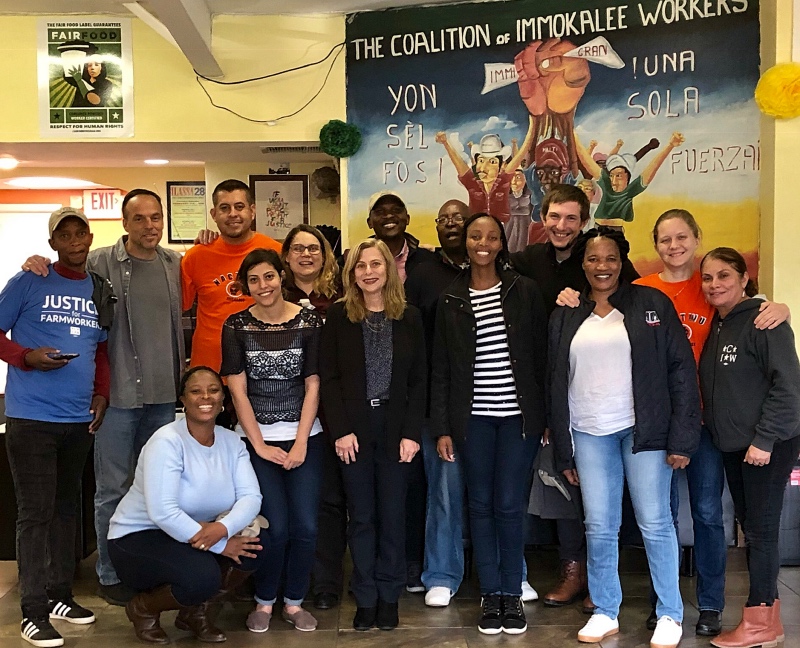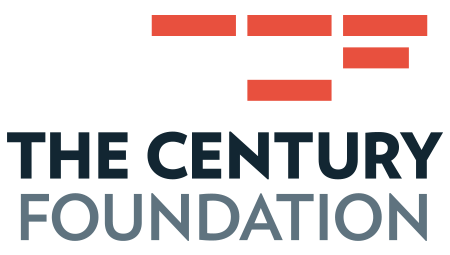
Thea Lee, Department of Labor’s deputy undersecretary for international affairs on the original Department of Labor report: “We commissioned the report,” she said, “precisely because there are so many versions of inadequate worker voice or social audits or corporate-driven compliance programs. We really wanted to have a well-researched, well-articulated framework with clear examples that would be of real value to corporations, to government, to unions and to organizers who are trying to create something better for workers.”
Lee on the CIW: “The Coalition was really able to make something out of nothing. They were able to leverage the power of the big buyers, like Taco Bell, Whole Foods and McDonald’s in the purchase of tomatoes to create a framework where the growers on the bottom of the supply chain need to be responsive and follow the Fair Food standards….”
Steven Greenhouse, former New York Times labor reporter, writing for the Century Foundation in new analysis of DOL study on worker voice: “I immediately thought that worker-driven social responsibility was an idea whose time had come. Championed by… the Coalition of Immokalee Workers, worker-driven social responsibility would in theory ensure more thorough inspections, more rigorous follow through, and more listening to the voice of workers. It also meant greater protection of workers’ anonymity and less threat of retaliation.”
Greenhouse on future of worker voice: “If you want to improve working conditions and end workplace abuses, if you are sincere about ensuring workers’ health and safety, not only is it essential to listen to workers’ voices, but it is vital to give workers a strong voice in shaping and running any program that aims to assure fair and safe treatment of workers.”
Last week, we shared key excerpts of the US Department of Labor’s groundbreaking report: “Worker Voice: What it is, what it is not, and why it matters,” which demonstrated that effective worker voice provides for safer workplaces, more robust communities, and stronger democracies. That report highlighted the work of the Coalition of Immokalee Workers in forging a new paradigm for protecting workers’ fundamental human rights in global supply chains in the 21st century: Worker-driven Social Responsibility (WSR).
The DOL report’s unblinking analysis of the failed Corporate Social Responsibility model, and of the unprecedented success of WSR programs like the CIW’s Fair Food Program, attracted the attention of the New York City-based Century Foundation, “one of the oldest progressive policy research institutes in the country,” which contracted Steven Greenhouse, the well-known former labor reporter for New York Times, to review the report and analyze it findings.
The resulting long-form article, titled “Creating a Stronger Voice for Workers,” brings together Mr. Greenhouse’s decades-long reporting on workers’ struggles to protect their essential rights in opaque supply chains, and his chronicling of the rise of WSR through programs like the CIW’s Fair Food Program, protecting farmworkers in the US and increasingly overseas, and the International Accord, protecting garment workers in Bangladesh and Pakistan, in a detailed and wide-reaching analysis.
We are sharing a few select highlights, along with the article’s thoughtful conclusion, below, though we strongly encourage you to read the piece in its entirety by clicking here.

Creating a Stronger Voice for Workers
By Steve Greenhouse
EXCERPTS:
**************
Discussing the Coalition of Immokalee Workers, Lee — who had once been a top economist at the AFL-CIO — told me:
It’s in southern Florida in agriculture, where you can’t just say, “Form a union,” because there are legal obstacles. The Coalition was really able to make something out of nothing. They were able to leverage the power of the big buyers, like Taco Bell, Whole Foods and McDonald’s in the purchase of tomatoes to create a framework where the growers on the bottom of the supply chain need to be responsive and follow the fair food standards.
The Coalition of Immokalee Workers succeeded in pressuring several well-known companies into joining its enforceable brand agreement, a model that requires companies to halt purchases or take other action against suppliers that violate a code of conduct. “Enforceable brand agreements,” Lee said, “are a very valuable framework, particularly in areas where it isn’t so easy to organize a union.”
**************
In discussing the Coalition of Immokalee Workers and other efforts, the Worker Voice report emphasizes that workers feel encouraged and empowered to speak up when they don’t fear retaliation and when independent investigators who aren’t dominated by employers investigate their complaints.
**************
Scott Nova, executive director of the Worker Rights Consortium, a factory monitoring group sponsored by 185 universities, said:
‘The fundamental problem with corporate social responsibility programs from a practical standpoint is that they are not binding on the brands. They make voluntary commitments, and they fulfill them or not as they see fit. There is a built-in conflict of interest between upholding labor rights and the brands’ economic priorities when their whole global economic posture is about reducing production costs. That’s in conflict with any promise you make on worker rights. It costs more to produce under good conditions than under bad conditions. If labor rights commitments are not built in, then any profit-making entity will prioritize profit over fulfilling those commitments.’
**************
IndustryArc, a company that does market research about global supply chains, estimates that businesses spend around $25 billion a year worldwide on CSR programs. Lee asserted that that’s a waste of money—money that could be used to improve pay and working conditions. Lee said:
We’re telling people to stop wasting money on these third-party audits. Stop self-auditing when you don’t have workers involved in every part of the process. There’s starting to be a consensus about the uselessness of voluntary corporate social responsibility measures. For a long time, companies would say, “We have a corporate code of conduct, and everything is fine. We self-certified ourselves to be fair trade this or that.” Then, especially after Rana Plaza, there was a realization that these things aren’t worth the time or money. The Rana Plaza building was certified by corporations’ social auditors just days before it collapsed to the ground. That social audit was useless.
**************
CONCLUSION:
Worker-Driven Social Responsibility Comes of Age
In my nineteen years covering labor for the New York Times, I often wrote about factory workers being mistreated and about companies boasting that they had adopted corporate social responsibility programs to ferret out and fix any abuses. But far too many times, it became clear that those corporate-sponsored efforts not only failed to detect obvious problems inside factories, but also failed to follow through to fix the problems that they had found.
The corporate-sponsored monitors usually interviewed workers inside factories, and that often made workers scared to talk freely—they worried that factory managers would see them talking to the inspectors. Many workers also feared that the investigators wouldn’t keep their names confidential. Workers often complained that the monitors interviewed too few workers at their factory, making many workers feel that they were overlooked and had little voice. (In sharp contrast, the [CIW’s] Fair Food Standards Council interviews more than half the covered farm workers each year to ask about how they are treated. That gives them a sense of voice and empowerment.)
Very unfortunately, for many CSR inspections, managers were tipped off in advance on when the inspections would take place, enabling them, for instance, to unlock exits they usually kept locked or to tell child laborers not to report to work that day. In Bangladesh, some factory inspectors hired by Western brands didn’t even bother to check or report whether factories had fire escapes, saying that was the responsibility of local building inspectors.
In light of all this, it was hard not to grow skeptical about corporate social responsibility programs, especially after Tazreen and Rana Plaza. In the years after those disasters, a movement emerged that called itself Worker-Driven Social Responsibility, coalescing around the idea that worker groups, not corporations, should be in charge of factory and farm inspection programs, or should at least have a strong say alongside employers in shaping and overseeing those programs.
I immediately thought that worker-driven social responsibility was an idea whose time had come. Championed by … the Coalition of Immokalee Workers, worker-driven social responsibility would in theory ensure more thorough inspections, more rigorous follow through, and more listening to the voice of workers. It also meant greater protection of workers’ anonymity and less threat of retaliation.
The Fair Food Standards Council, the Bangladesh Accord, the Lesotho Agreements, and the Dindigul Agreement are all examples of worker-driven social responsibility—programs created in response to pressure from workers and in which workers have a major say. I remember what one champion of worker-driven social responsibility told me: “We want to go from a culture of audit-and-ignore to a culture of inspect-and-remedy,” said Ineke Zeldenrust, director of the Clean Clothes Campaign, a European-wide anti-sweatshop group.
The Department of Labor’s new Worker Voice report reaches the same logical conclusion that the worker-driven social responsibility movement has trumpeted, and an important conclusion it is: If you want to improve working conditions and end workplace abuses, if you are sincere about ensuring workers’ health and safety, not only is it essential to listen to workers’ voices, but it is vital to give workers a strong voice in shaping and running any program that aims to assure fair and safe treatment of workers.
Read the piece in its entirety by clicking here.
